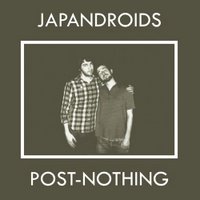
Japandroids
Post-Nothing
(Unfamiliar; 2009)
By Calum Marsh | 13 April 2009
At the end of his essay E Unibus Pluram: Television And U.S. Fiction, the late David Foster Wallace calls for a rejection of postmodern irony in favor of a return to sincerity. In reaction to cold distance and shallow sophistication, Wallace wants artists “who treat of plain old untrendy human troubles and emotions in U.S. life with reverence and conviction [...] who eschew self-consciousness and hip fatigue.” There’s recognized danger in such a move, of course, but that’ll be the point: “The new rebels might be artists willing to risk the yawn, the rolled eyes, the cool smile, the nudged ribs, the parody of gifted ironists, the ‘Oh, how banal’.” Wallace’s essay was published in 1990, and in the nearly two decades since we’ve seen the slightest of nudges in that direction: the endearing fiction of Dave Eggers, Michael Chabon, and Zadie Smith; the whimsical films of Michel Gondry, Miranda July, and Jason Reitman; and now, in a somewhat slight but nevertheless refreshing sense, the earnest music of Japandroids.
DFW’s thesis seems to encourage a wave of naivety and heart-on-sleeve sap, but the best anti-ironists know better than to go full-mushy. There’s a balance to be struck between earnestness and irreverence, between being heartfelt and being entertaining. So while Bright Eyes or Frightened Rabbit never fail to emote—hearts don’t just bleed, they hemorrhage—the material’s taken so damn seriously that it’s difficult to, well, take seriously. A more considered foray into the territory outlined by Wallace ought not to forget that there’s a paying audience to keep pleased; nobody wants to go home bored.
And so: Post-Nothing. Like the title suggests, this album’s a rejection of the proliferation of “post-” anything and everything, an entirely unpretentious rock record about girls (loving them then quitting them), boys (they’re leaving town), Vancouver (their hometown), and, naturally, growing up (= sad). It’s less a nostalgic harkening-back to a vaguely-defined “better time” than a document of an unavoidably romanticized period of young life. Like Michael Chabon’s The Mysteries Of Pittsburgh, Post-Nothing feels like a love letter to summer, one undoubtedly less exciting unfolding than thought back on; a summer filled, as Chabon describes it, “with a frail and sad exhilaration,” but also with cheep beer, good friends, and french kissing. It’s all quite charming and lovely.
The record breaks out of the gate strong with the solid one-two of “The Boys Are Leaving Town” and lead single “Young Hearts Spark Fire.” “Boys” is as energetic as it is simple, its forward momentum setting the pace of the album early. For a two-piece band, Japandroids are surprisingly adept at fleshing out their fairly straight-forward songs. In contrast to the more minimal music of the White Stripes (to whom all two-piece rock groups are immediately compared), the songs on Post-Nothing are impressively full-bodied. “Young Hearts” has been making the rounds in the blogosphere, and for good reason: it’s hard not to fall in love with a sentiment as simple as “We used to dream / But now we worry about dying / I don’t want to worry about dying / I just want to sing about those sunshine girls,” particularly when yelled by these guys at the very top of their lungs. And, Christ, that yell: love them or hate them, you really can’t fault Japandroids for ever phoning it in or sounding bored. Practically every line on this album, from “we can french kiss some French girls!” to “I quit girls!” is belted out like it’ll be their last.
If “sentimentality plus yelling” sounds like the equation for modern emo, you wouldn’t be too far off. But Japandroids loot the genre’s earlier forms (think Sunny Day Real Estate, not My Chemical Romance), taking what works and shedding the rest. The sing-along slowjam refrain that carries “Crazy/Forever” might strike distanced skeptics as emotionally excessive, but the track—like the rest of Post-Nothing—is drowned in enough distortion to avoid the irksome gleam of radio-ready emo. As sentimentality rises, so too, typically, does the quality of production (possibly something to do with the abrasive nature of lo-fi), but their aesthetic proclivities clearly lie closer to the Jesus & Mary Chain than to Jimmy Eat World. The sense in which this heightens the record’s “authenticity” is more than a little dubious, yet it does veer things away from the banality so easily associated with professional production sheen, especially given the heart-on-sleeve nature of the music.
Does this sound too flowery and sentimental? Maybe. And maybe Post-Nothing does, too. But, like Wallace wrote, isn’t that part of the point? Japandroids “have the childish gall actually to endorse and instantiate single-entendre principles,” but I’ll take that over cold distance and hollow irony any day. Stuck squarely in the rut shaped by postmodern fiction and television, so much contemporary music exhaustingly relies on the same old cheap tricks and gimmicks: pastiche, high concepts, self-reference, over-intellectualism or drastic anti-intellectualism, and irony, irony, irony. I hope it doesn’t sound trite to suggest that Post-Nothing, if not an outright revelation or revolution, is at least a movement in the right direction.





